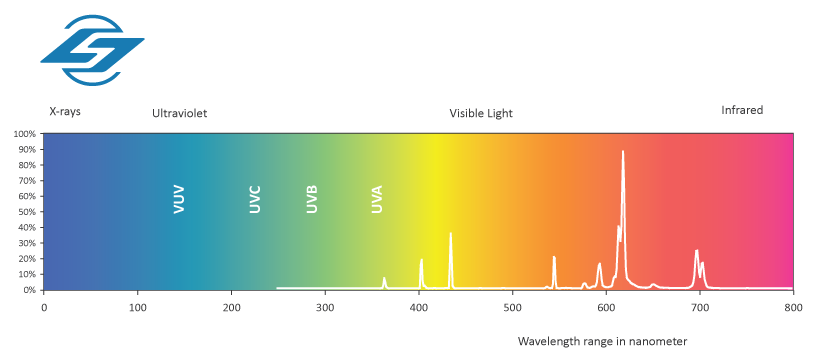The Greatest Guide To Uvc Light
The Greatest Guide To Uvc Light
Blog Article
The 9-Minute Rule for Uvc Light
Table of ContentsWhat Does Uvc Light Do?The 8-Second Trick For Uvc LightMore About Uvc LightThe Ultimate Guide To Uvc LightThe Of Uvc LightUvc Light for Dummies
A new kind of ultraviolet light that may be risk-free for people took much less than 5 minutes to lower the level of indoor air-borne microorganisms by greater than 98%, a joint study by scientists at Columbia College Vagelos University of Physicians and Surgeons and in the U.K. has actually located. Even as microbes remained to be sprayed into the room, the degree remained really reduced as lengthy as the lights were on.Up until currently these studies had only been conducted in little speculative chambers, not in full-sized areas resembling real-world conditions. In the current research, researchers at the University of St. Andrews, College of Dundee, University of Leeds, and Columbia College examined the efficacy of far-UVC light in a big room-sized chamber with the very same ventilation price as a regular home or workplace (about three air adjustments per hour).
The efficacy of different approaches to minimizing interior infection levels is usually determined in regards to equal air changes per hour. In this study, far-UVC lamps created the equivalent of 184 equivalent air exchanges per hour. This goes beyond any other method to sanitizing busy interior rooms, where 5 to 20 comparable air changes per hour is the very best that can be accomplished virtually.
The Best Guide To Uvc Light

The primary specifications of UV-C disinfection are wavelength, dose, family member humidity, and temperature level. There is no agreement regarding their optimal values, but, in general, light at a high dose and a spectrum of wavelengths having 260 nm is favored in a setting at area temperature with low relative moisture. This light can be produced by mercury-vapour, light-emitting diode (LED), pulsed-xenon, or excimer lights.
UV-C disinfection systems have encouraging features and the possible to enhance in the future. UV-C sanitation should presently be taken into consideration for low-level instead than top-level disinfection.
An additional application emerged in 1910 when UV light was used to decontaminate water. Nowadays, UV light is made use of for water, air, food, surface area, and clinical equipment disinfection.
Uvc Light Fundamentals Explained
This results in the disruption of DNA or RNA, leading to the inactivation of the micro-organism. UV-C-induced DNA disturbance commonly consists of the bonding of two adjoining thymine (or cytosine) bases instead of the traditional connecting of a base with its corresponding base on the other strand.

The UV-C area is utilized for sanitation but there is no agreement on the precise ideal wavelength. Light at 260 nm can create the most disruption. Different micro-organisms are most vulnerable to a little different wavelengths.
4 Simple Techniques For Uvc Light
On the various other hand, it has technical ramifications because the total energy of the light beam of light is after that my website divided over all present wavelengths. A micro-organism that is vulnerable to 254 nm light will certainly be inactivated much more by a lamp that emits exclusively light at 254 nm than a light that releases a wavelength range at equal total power.
Exposure times of 1045 min for space sanitation and 25 s to 5 min for clinical equipment were experienced in literary works. The strength is vice versa proportional to the made even range between the source of light and the surface and is for that reason defined at the surface in the dose calculation formula [14]
Additionally, the outcome of a lamp decreases with time, so it is advised to compute the dose at the end of lamp life, which is agent of a worst-case scenario. The dosage likewise influences the quantity of photoreactivation. Quek et al. found that the percentage of photoreactivation reduced from 5.31% to 0% for a rise in dose from 1.6 to 19.7 mJ/cm2 [8]
The impact of temperature depends on the light source.
Uvc Light - Truths


This is understood as far UV-C innovation and is a relatively brand-new sanitation method with minimal knowledge about its efficiency. This makes it riskier to completely count on this innovation for sanitation in the health center and it is for that reason not widely utilized [21] Nonetheless, visit the site it likewise has benefits such as a decreased threat for use near people due to a reduced infiltration depth into the skin and eyes [ 26]
In research study, the outcomes on pulsed versus constant UV-C disinfection effectiveness differ. When comparing pulsed and continual light it is vital to maintain other variables such as wavelength and dose consistent. Nyangaresi et al. and Sholtes et al. both located that pulsed or constant light sent out by LEDs resulted in equivalent log10 decreases [15,28]
Some Known Details About Uvc Light
In case ozone is not required for disinfection, a changed light can be made use of. For mercury-vapour lamps, drugged quartz glass or specialized soft glass can strain short-wave UV-C light. For pulsed-xenon, drugged quartz can be used also [30] UV-C has encouraging features for disinfection such as automatic sanitation, being much less time-consuming than commonly utilized guidebook or chemical sanitations, leaving no dangerous residuals, and being eco-friendly (if no mercury-vapour lights are used) [31,32]
Report this page